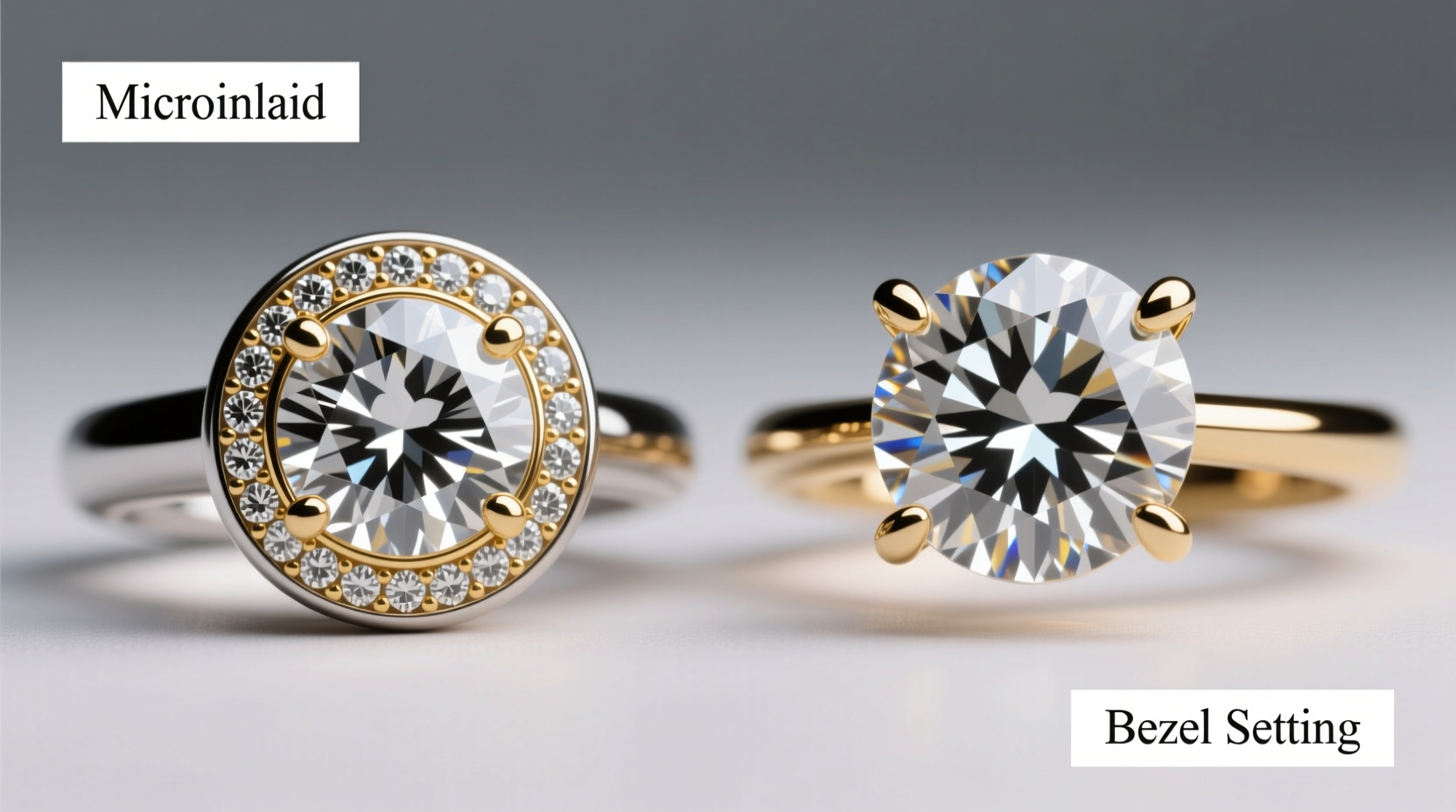When selecting an engagement ring or fine jewelry piece, most attention goes to the diamond itself—the cut, color, clarity, and carat weight. But the setting is just as critical. Two popular styles, microinlaid and bezel settings, offer distinct advantages in security, aesthetics, and maintenance. Understanding their differences isn’t just about design preference; it’s about long-term wearability, protection of your gemstone, and how light interacts with the diamond. The setting truly matters—not just for beauty, but for function.
Understanding Microinlaid Settings

Microinlaid, often referred to as micro-pave, involves embedding tiny diamonds into the metal surface of a ring’s band or shank using minuscule beads or prongs. This technique creates a continuous sparkle that mimics a seamless field of glittering stones. It's a favorite among those who want maximum brilliance without a large center stone dominating the design.
The precision required for microinlaid work is immense. Jewelers use specialized tools to drill tiny holes and set each micro-diamond individually, ensuring even spacing and alignment. Because of this craftsmanship, microinlaid settings are often seen in high-end bridal collections and designer pieces.
Pros and Cons of Microinlaid Settings
- Pros: Exceptional sparkle, luxurious appearance, enhances center stone visually
- Cons: High maintenance, vulnerable to snagging, expensive to repair if stones become loose
Exploring Bezel Settings
A bezel setting encircles the diamond completely with a thin strip of metal, holding it securely in place. Unlike prong settings, which expose parts of the stone’s girdle, the bezel fully wraps around the gem, offering superior protection. This makes it ideal for active lifestyles or anyone concerned about chipping or losing a stone.
Bezel settings come in two main types: full bezel (metal wraps entirely around the stone) and partial bezel (metal covers only a portion of the girdle). Modern interpretations often feature sculpted or decorative bezels that double as design elements.
“Bezel settings are a smart choice for people who value practicality without sacrificing elegance. They protect the diamond while giving a sleek, contemporary look.” — Daniel Ruiz, Master Jeweler & GIA Graduate
Pros and Cons of Bezel Settings
- Pros: Maximum security, resistant to catching on fabric, low maintenance, modern aesthetic
- Cons: Can make the diamond appear slightly smaller, limits light entry from the sides, harder to resize
Microinlaid vs Bezel: A Direct Comparison
| Feature | Microinlaid Setting | Bezel Setting |
|---|---|---|
| Diamond Security | Moderate – small stones can loosen over time | High – full metal enclosure prevents loss |
| Brilliance & Light Performance | Excellent – multiple angles of reflection from surrounding stones | Good – less side light entry, but strong top brilliance |
| Maintenance Needs | High – requires frequent inspections and re-tipping | Low – minimal upkeep, easy to clean |
| Lifestyle Suitability | Best for formal wear or low-impact daily use | Ideal for active individuals or manual labor |
| Resizing Difficulty | Moderate to difficult, depending on pave coverage | Challenging – bezel must be adjusted carefully |
How Setting Choice Impacts Longevity and Style
The setting you choose directly affects how your ring ages. Microinlaid designs may lose stones over time, especially if worn daily without care. Even minor knocks can dislodge a micro-diamond, leading to cumulative damage. On the other hand, bezel settings resist such issues but may show wear along the rim where the metal contacts surfaces.
Styling-wise, microinlaid offers vintage glamour and opulence. It pairs well with halo designs and intricate filigree work. Bezel settings lean toward minimalist, architectural aesthetics—popular in modern and gender-neutral designs. Your personal style, profession, and daily routine should guide your decision more than trends alone.
Mini Case Study: Sarah’s Active Lifestyle Decision
Sarah, a nurse and avid rock climber, initially fell in love with a microinlaid eternity band. However, after consulting her jeweler, she realized the tiny stones would likely pop out within months due to constant hand washing and glove use. She opted instead for a platinum bezel-set solitaire with a brushed finish. Three years later, her ring remains flawless—no repairs, no lost stones. While she misses some sparkle, she values reliability and peace of mind far more.
Step-by-Step Guide to Choosing the Right Setting
- Assess your lifestyle: Do you work with your hands? Exercise frequently? Handle machinery?
- Define your aesthetic: Are you drawn to classic elegance, modern minimalism, or bold luxury?
- Consider maintenance tolerance: Are you willing to bring your ring in for professional checks every 6–12 months?
- Evaluate budget beyond initial cost: Factor in potential future repairs, especially for microinlaid work.
- Try both settings on: Visit a reputable jeweler and compare how each feels and looks on your hand.
Frequently Asked Questions
Can a microinlaid ring be repaired if stones fall out?
Yes, most jewelers can replace missing micro-diamonds and re-secure loose ones. However, repeated repairs may weaken the metal framework over time, increasing future risks.
Does a bezel setting make a diamond look smaller?
Sometimes. Because the metal surrounds the girdle, it can visually reduce the perceived size of the stone compared to a prong or microinlaid setting that exposes more of the diamond’s surface.
Is one setting more expensive than the other?
Microinlaid typically costs more due to labor intensity. Setting dozens of tiny diamonds by hand requires hours of meticulous work. Bezel settings are simpler to execute but may require more precious metal, depending on design complexity.
Checklist: Choosing Between Microinlaid and Bezel
- ☐ I lead an active lifestyle or work with my hands → lean toward bezel
- ☐ I prioritize maximum sparkle and luxury detail → consider microinlaid
- ☐ I want low-maintenance jewelry → choose bezel
- ☐ I’m open to semi-annual professional inspections → microinlaid viable
- ☐ I prefer a modern, clean look → bezel may suit better
- ☐ I love vintage-inspired designs → microinlaid complements well
Final Thoughts: Yes, the Setting Really Matters
While the diamond’s quality forms the foundation of any fine piece, the setting determines how that beauty is framed—and how well it endures. Microinlaid settings dazzle with fire and sophistication but demand vigilance. Bezel settings offer quiet strength and resilience, perfect for real-world living. Neither is inherently superior; the best choice aligns with how you live, what you value, and how you define lasting beauty.









 浙公网安备
33010002000092号
浙公网安备
33010002000092号 浙B2-20120091-4
浙B2-20120091-4
Comments
No comments yet. Why don't you start the discussion?